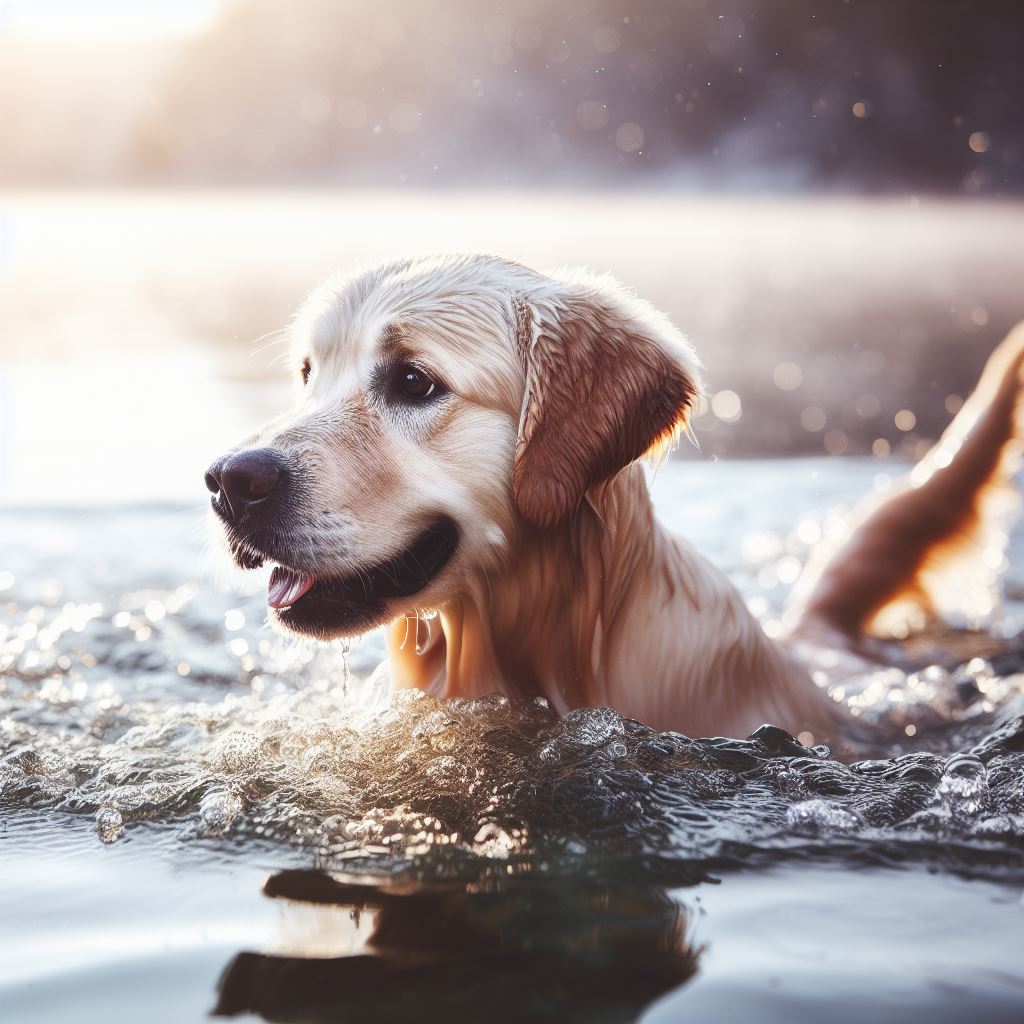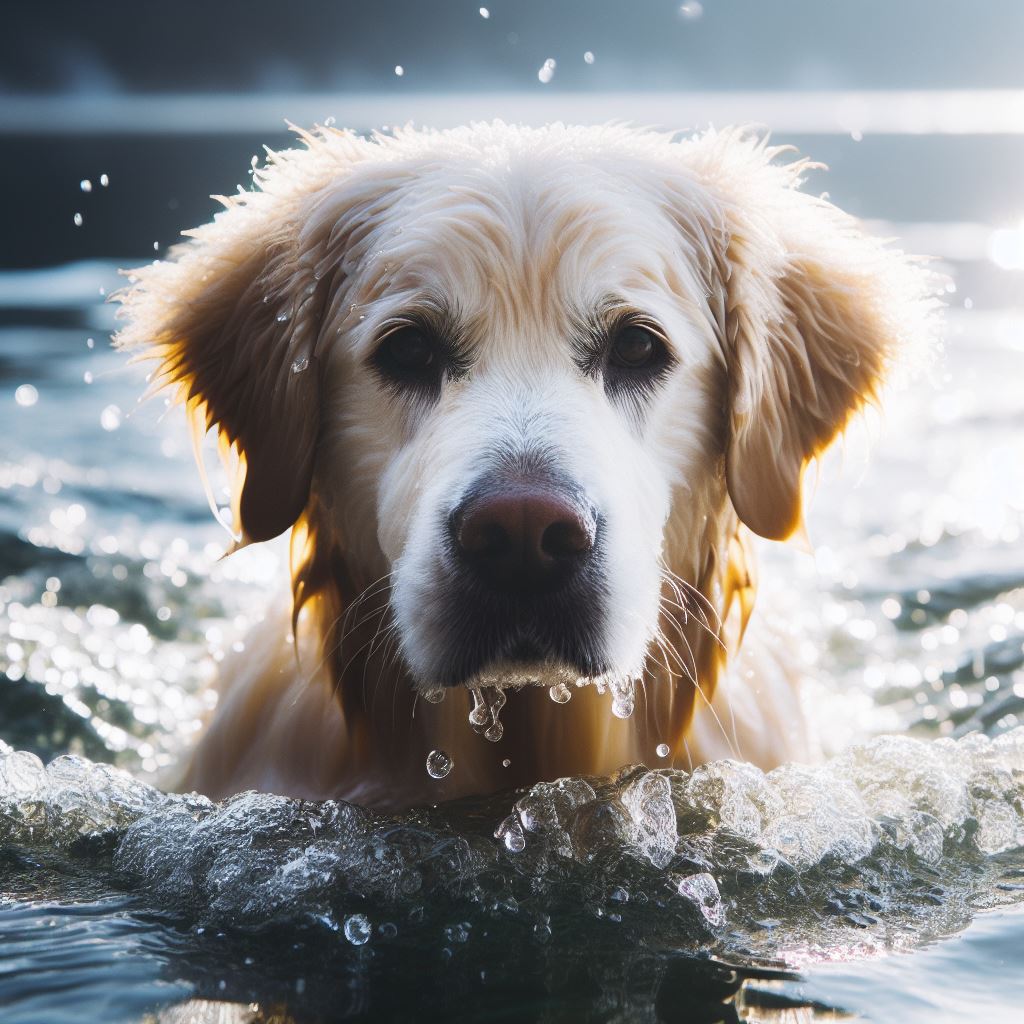Can Golden Retrievers Swim In Cold Water? (Everything You Need To Know!)
Golden retrievers are known for their love of water and swimming. Their water-repellent coats allow them to comfortably swim in most conditions. However, very cold water temperatures can be dangerous for any dog. So how well can golden retrievers tolerate and swim in cold water?
The golden retriever is one of the most popular dog breeds, well-known for their friendly personalities and love of water. Goldens were originally bred in Scotland as gundogs to retrieve waterfowl. Their water-resistant coat and webbed feet make them excellent swimmers.
Most goldens enjoy swimming year-round if given the chance. However, frigid winter waters or icy lakes may deter even the most eager swimmer. Knowing your dog’s limits is important to keep them safe and healthy.
So can golden retrievers swim in cold water? The answer depends on several factors. We’ll discuss how cold temperatures affect dogs, signs of hypothermia, and tips on cold water safety for your golden. With proper precautions, goldens can safely take a dip even in chilly waters.

How Cold Temperatures Affect Dogs
To understand how golden retrievers handle cold water, it helps to know how low temperatures impact canines. Some factors include:
Body Temperature
- Normal body temperature for dogs is 101-102.5°F
- External cold causes body temperature to drop
- Water conducts heat away from the body 25x faster than air
Fat Layer
- Insulates and provides some warmth in water
- Goldens have decent fat reserves for insulation
Muscle Mass
- Shivering muscles generate heat
- Goldens have less muscle than leaner breeds for warmth
Circulation
- Vasoconstriction reduces blood flow to extremities
- Keeps vital organs warm but cools skin
So while healthy goldens have some natural protections against the cold, swimming in very frigid waters can overwhelm these defenses. Let’s look at signs of hypothermia next.
Signs of Hypothermia in Dogs
Hypothermia occurs when a dog’s body temperature drops below their normal range. It becomes life-threatening at temperatures below 94°F.
Mild Hypothermia (94-99°F)
- Shivering, restlessness
- Lethargy, weakness
- Whimpering, shivering cries
Moderate Hypothermia (90-94°F)
- Muscle stiffness
- Sluggishness, stupor
- Pale or blue gums
Severe Hypothermia (< 90°F)
- Uncoordinated movements
- Collapse, unconsciousness
- Irregular heartbeat
- Not breathing
Hypothermia occurs more readily in cold water since heat is lost much faster than in cold air. Smaller dogs are at greater risk as they lose body heat more quickly.
Golden Retriever Cold Water Safety Tips
While goldens were bred to retrieve in cold waters, you should still use caution before letting your dog swim in frigid temperatures. Here are some tips:
- Start young – Introduce swimming in cold water early so they become acclimated. Avoid shocking their system.
- Acclimate – If they aren’t young, give them time to adjust to cool water before extensive swimming.
- Limit time – Don’t overdo it the first few times in cold water. Start with short sessions and increase duration.
- Dry thoroughly – Towel dry thoroughly and use a blow dryer on low after any cold water swim.
- Bring a coat – Have them wear a coat or wetsuit for extra insulation and wind protection.
- Watch for shivering – Shivering means it’s time to get them warm and dry. Prolonged shivering can lead to hypothermia.
- Check paws – Rinse and dry paws after. Check for any cuts from ice or rough terrain.
- Avoid ice – Don’t allow jumping into icy waters or swimming near ice floes.
- Check air temps – If air temp is also very cold, limit their exposure to prevent excessive heat loss.
- Know your dog – Not all goldens tolerate the cold equally. Adjust to your individual dog’s comfort level.
With proper introduction and safety measures, most healthy goldens can swim in moderately cold water temperatures. But you may need to rule out frigid conditions to prevent hypothermia.

What Water Temperatures Are Safe for Golden Retrievers?
So at what water temperatures should you keep golden retrievers out of the water? There is no defined cut off, but here are some general guidelines:
- Above 60°F – Very comfortable and safe for most goldens
- 50-60°F – Chilly but fine with proper acclimation
- 40-50°F – Borderline temperatures, limit time in the water
- Below 40°F – Risk of hypothermia, avoid prolonged swimming
Factors like the individual dog, air temp, wind chill, precipitation, and trip duration also impact cold tolerance. When in doubt, err on the side of caution to be safe.
Are Golden Retrievers Good in Cold Water?
Goldens have a reputation as excellent cold water dogs thanks to their ancestry. The thick, water-repellent coat provides insulation against chilling waters. Let’s look at why they excel at cold water retrieval:
- Webbed Feet – Webbing gives them powerful propulsion in water and mud.
- Oily Coat – Their oily outercoat causes water to bead up and roll off.
- Thick Undercoat – The soft, dense undercoat acts as insulation against the cold.
- Fat Reserves – Ample fat storage provides extra insulation and energy.
- Muscular Build – Well-developed chest, shoulders, and hindquarters provide stamina.
So while not invincible in frigid waters, goldens have superb physical traits to help maintain body heat when swimming in colder conditions.
What About Ice and Snow?
Extended exposure to ice, snow, and freezing waters pushes cold tolerance to the limits even for hardy goldens. Signs it’s too cold for swimming include:
- Shivering or whining – Shivering is the body’s way to generate warmth. Whining indicates discomfort.
- Hesitation – Balking at entering the water is a sign it may be too cold.
- Ears or Tail Tucked – Tucked ears or tail indicates a stressed, uncomfortable dog.
- Seeking Warmth – Getting out quickly or reluctance to re-enter could mean they are getting too cold.
Frigid waters also increase risks like hypothermia and frostbite on ears, tail, and paw pads. Ice brings hazards like slipping, falling through, or getting trapped. Play it safe and keep your golden out of icy waters.
Key Takeaways
- While goldens can swim in cold water, very frigid temperatures pose dangers like hypothermia
- Know the signs of mild, moderate, and severe hypothermia in dogs
- Limit time in cold water, watch for signs of intolerance, and take preventive measures
- Ideal water temp is above 60°F – below 40°F is high risk
- Physical traits like oily coats and webbed feet make goldens well-equipped for colder water
- Avoid ice, snow, or water cold enough to cause shivering
FAQs
How cold is too cold for golden retrievers to swim?
There’s no definite cut off, but below 40°F poses high risk of hypothermia. Limit time in water below 50°F. Ideal temps are above 60°F. Know your dog’s tolerance and watch for signs of intolerance.
Do golden retrievers like ice and snow?
Most goldens enjoy ice and snow in moderation. But freezing water, thick ice, and blizzard conditions can be dangerous. Don’t allow prolonged exposure, especially in water. Check paws for ice and salt damage.
Should I put a coat on my golden retriever when swimming in cold water?
A coat or wetsuit provides extra insulation against frigid water and wind chill during and after swimming. This allows goldens to enjoy cold water more safely and comfortably. Choose coats designed for swimming/retrieving.
Can swimming in cold water make my golden retriever sick?
Yes, swimming in water cold enough to lower your dog’s body temperature can lead to hypothermia. Other risks include pneumonia, goiter, gastrointestinal issues, and skin damage from extremes. Introduce cold water slowly and monitor tolerance.
How do I warm up my golden retriever after cold water swimming?
After any cold water swim, gently dry their coat, place a coat or blanket over them, and keep them warm and sheltered. You can also use a blow dryer on low heat to speed up drying and warming. Avoid extreme temperature changes.
Conclusion
Thanks to their physical traits and heritage, golden retrievers are one of the best cold water dogs. But very frigid waters still pose dangers like hypothermia and frostbite. While goldens can gradually acclimate to cold water swimming, it’s important to monitor tolerance and avoid extremes. With proper precautions, your golden can safely enjoy retrieving in most moderately cool waters. Just be alert for signs of intolerance and make sure to keep sessions short in colder temperatures.



I’m sorry but the last 2 paragraphs are untrue and contradictory to previous mentioned descriptions of Golden Retrievers. They are able to handle cold very well. They have strong build, good musculature and most importantly a double thick coat. I live in the mountains and most of the search and rescue dogs are Golden Retrievers. We have a golden who loves to roll around and play in the snow. She even sleeps in the snow at night for as long as we’ll let her.
Thank you for bringing this to my attention. You make a fair point. I appreciate you taking the time to provide feedback. My team has updated the article to reflect your insights and correct the inaccuracies. Thanks again!